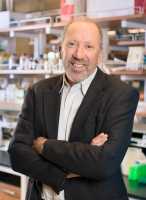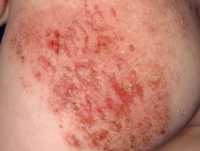
24 Feb Bacteria From Healthy Human Skin Can Be Used to Treat Atopic Dermatitis – Eczema
MedicalResearch.com Interview with:

Dr. Gallo
Dr. Richard Gallo, MD, PhD
Ima Gigli Distinguished Professor of Dermatology
Chair of the Department of Dermatology
UC San Diego School of Medicine
MedicalResearch.com: What is the background for this study? Would you briefly explain what is meant by atopic dermatitis/eczema? How common is it and what are the symptoms.
Response: Atopic Dermatitis is a common inflammatory disease of the skin that appears in up to 20% of children and 3% of the adult population. People suffering from atopic dermatitis have red, itchy skin. In many cases this rash will disrupt sleeping and severely impact quality of life. Also, people with atopic dermatitis are more susceptible to infections of the skin and are more likely to have other allergies and asthma.
MedicalResearch.com: What are the main findings?
Response: This paper shows how a bacteria that is found on healthy human skin can be used safely to treat people with atopic dermatitis. A total of 54 adults were treated in a double-blind, placebo controlled human trial. The technique used is a transformational approach to treating disease since we specifically chose the bacteria for use based on specific bacterial genes that were missing from the microbiome of atopic patients. The exciting part of the work is that this is the first time the approach of targeted bacteriotherapy has been used for a skin disease, and the trial shows it is safe and helped most of the patients who received it.

One exxample of eczema-atopic dermatitis DermNet.nz
MedicalResearch.com: What should readers take away from your report?
Response: The paper adds to the growing body of evidence that shows how dependent we are on some bacteria for our health. Discovering beneficial bacteria has taken many years since most bacteria are not helpful or even dangerous. This is a breakthrough study since it confirms which bacterial genes are needed to benefit patients with atopic dermatitis.
MedicalResearch.com: What recommendations do you have for future research as a result of this work?
Response: With this as a proof of principle we can now expand the size of the study to include more patients and to apply this approach to more diseases.We have also expanded our screening platform to look at other skin diseases and are excited to advance these programs into the clinic.
Any disclosures?
The technology described in the study has been licenced by MatriSys Bioscience, a San Diego based biotechnology company. Dr. Gallo is cofounder and a member of the MatriSys scientific advisory board.
Citation:
Teruaki Nakatsuji, Tissa R. Hata, Yun Tong, Joyce Y. Cheng, Faiza Shafiq, Anna M. Butcher, Secilia S. Salem, Samantha L. Brinton, Amanda K. Rudman Spergel, Keli Johnson, Brett Jepson, Agustin Calatroni, Gloria David, Marco Ramirez-Gama, Patricia Taylor, Donald Y. M. Leung, Richard L. Gallo. Development of a human skin commensal microbe for bacteriotherapy of atopic dermatitis and use in a phase 1 randomized clinical trial. Nature Medicine, 2021; DOI: 10.1038/s41591-021-01256-2
JOIN OUR EMAIL LIST
[mailpoet_form id="5"]We respect your privacy and will never share your details.
Last Modified: [last-modified]
The information on MedicalResearch.com is provided for educational purposes only, and is in no way intended to diagnose, cure, endorse or treat any medical or other condition. Always seek the advice of your physician or other qualified health and ask your doctor any questions you may have regarding a medical condition. In addition to all other limitations and disclaimers in this agreement, service provider and its third party providers disclaim any liability or loss in connection with the content provided on this website.
Last Updated on February 24, 2021 by Marie Benz MD FAAD
